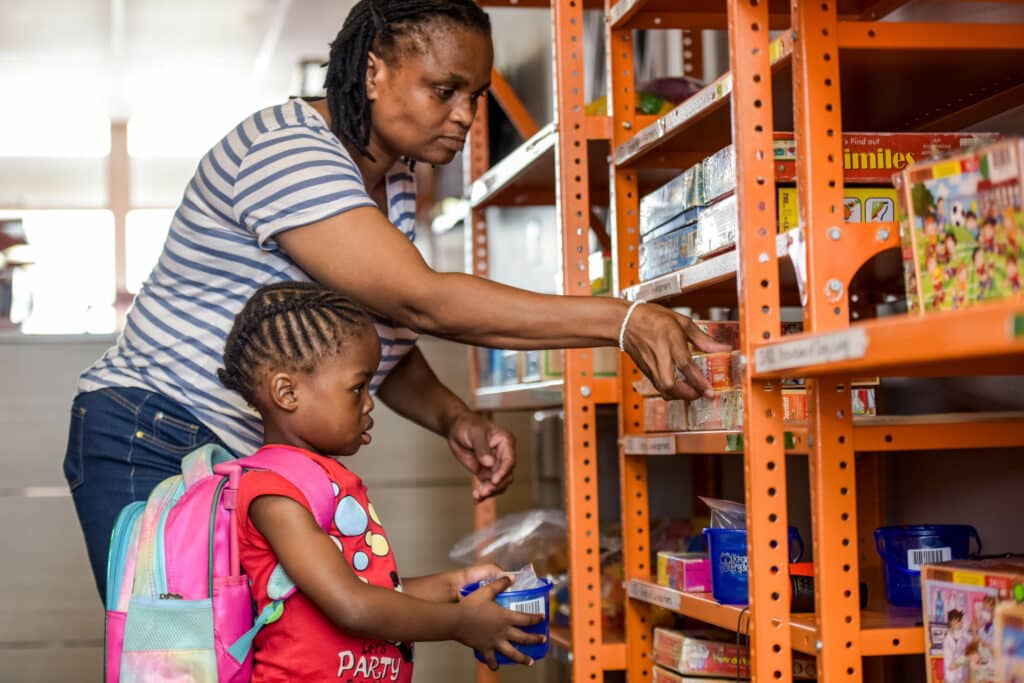Cotlands has a rich legacy of innovation. What began as a home for abandoned babies in 1936 has evolved into a dynamic ECD organisation that continually adapts to meet children’s most pressing needs effectively.
We spoke to Cotlands’ Operations Manager Angie Bezuidenhout to find out what their ELOM data says about their approach and how they apply these insights to innovate and amplify their impact.
The Cotlands Low Dose Approach
In a country like South Africa, where more than seven million children live below the food poverty line, providing effective early learning to vulnerable children is a monumental challenge.
Cotlands is tackling this challenge with a comprehensive ECD strategy incorporating mobile toy libraries, accredited ECD training, and a network of playgroups. These playgroups, in poorly resourced communities, offer “low dose” early learning to 1,200 children, from birth to four years of age.
“Our ‘low dose’ approach allows us to deliver quality early learning with limited resources. Children attend for just four hours, two or three days a week. The other days are used for training and preparation work with the early learning facilitators (ELFs).
WHAT THE DATA SAYS
The part-time approach makes sense from a resource perspective, but does it work from a learning perspective? Cotlands wanted unbiased, standardised data to benchmark the programme against established standards like those embedded in the ELOM 4&5 Years Assessment Tool and the 2021 Thrive by Five Index comparisons.
They conducted a baseline assessment in March 2023, followed by a follow-up assessment in November of the same year using the ELOM 4&5 Years Assessment and the Social-Emotional Rating Scale in English, isiZulu, Sepedi, Setswana, Siswati, Xitsonga and Sesotho. The results were remarkable.
“We hoped for a 20% improvement in ELOM 4&5 scores and got 33% more children on track in our sample of children. The lower dosage results were on par – and in some areas better – than benchmark results. Our children are achieving as much as those attending traditional 5 days-a-week programmes.”
After accounting for natural growth, participating in Cotlands programmes raised children’s total early learning scores by 9 points.



From left: Cotlands playgroup, parent session, checking out the Cotlands toy library
MAKING DATA MEANINGFUL
The impact of the assessments has been profound, and the data has been useful to shape future strategies and improve their programme. Some of the areas Cotlands has applied the data include:
Programme Improvement
Following each assessment, Cotlands held an internal think tank to identify areas of strength and those requiring attention. After the initial assessment, they analysed every aspect of the programme. “Rather than changing our learning plan, we focused on helping the ELFs better understand the ‘why’ behind it, empowering them to understand better what they were teaching.”
They’ve also applied the insights to goal setting and exploring new approaches to monitoring and engaging with parents.
Team Motivation
The assessments inspired the team to strive for excellence and foster a culture of continuous learning. The outstanding results gave good reason to celebrate. “Staff became more motivated, engaged and committed.”
Funding and Reports
The results have given Cotlands’ business development team powerful proof of the outcomes that can be achieved. “We use it in reports and proposals to show how contributions are making a measurable difference.”
It’s also provided concrete evidence of how playgroups and toy libraries can positively influence early learning scores, as Angie and colleagues Boitumelo Seabi and Thandi Mdaka presented at the South Africa National Conference on Play-Based Learning.
Family and Community
At a local level, Angie says that being able to share the proven benefits of Cotlands’ play-based learning approach has also helped foster trust and collaboration in the communities they serve and with parents. “It encourages parents to join our toy libraries which gives the children access to a much greater variety of educational toys and strengthens family bonds.”
A CASE FOR INVESTMENT
“Our results demonstrate that children attending part-time playgroups can be school-ready as long as they are part of a well-structured programme supported by effective resources like our toy libraries. It makes a powerful case for stakeholders and policymakers to invest in initiatives that support early childhood development in low-income communities,” says Angie.

“By prioritising play-based learning, we build a strong foundation for children’s future success and well-being. Let’s ensure that all children have access to quality early learning opportunities that nurture their curiosity, creativity, and innate potential.”
Angie Bezuidenhout, Operations Managers: Cotlands
All photos on this page courtesy of Cotlands.
